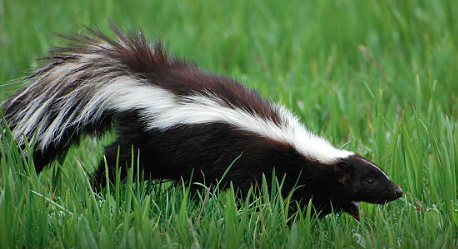What’s that Smell?
I woke up this morning and checked my email as I usually do. I had a notification email – from a neighborhood group that I am a part of – warning of a skunk in the area. Her dog had gotten sprayed and she was dealing with everything that goes along with that.
My dog has been sprayed a couple times so it brought back some not so fond memories. However, since this is something people have to deal with occasionally, especially those of us who are dog owners, I figured maybe it would be worthwhile sharing some information.

After an encounter with a skunk, in which a party is sprayed. (We will assume it is the family pet.) The most pressing concern is to deal with the irritating skunk smell. People always say to use tomato juice. I have tried that. My results were the smell was masked for a while (at best) and my normally white dog took on a sort of pink tinge. Plus, I think it still left a smell that I eventually got used to but others could still detect.
Then, I got to thinking about this… what makes the skunk smell so stinky? It was time to do some research! I found out that skunks have two glands along their anus that produce the skunk’s offensive spray, which is a mixture of sulfur-containing chemicals. Ah Ha! If it is chemical there ought to be a way of counteracting it or, better still, breaking down the chemical compounds to get rid of the smell. Let’s attack it chemically!
Thiols, or sometimes known as mercaptans, are contained in the skunk spray and are what needs to be taken care of.

I have found this solution to be pretty effective at attacking the thiols… mix 1 quart hydrogen peroxide, 1/4 cup baking soda and 1 teaspoon dish soap. (I use Dawn dish soap because it is known for its ability to cut oils — which is also its primary purpose in this solution!) This solution works by attacking the chemical bonds. The dish soap helps to wash away the oils that can have a lingering effect. Use this solution to wash the sprayed areas. Just be careful using it around the face and eyes!
Another possible alternative is to purchase a specialty skunk scent removal product. Numerous ones are available at pet stores and online. I have never used any of these (but I know people who have) because the hydrogen peroxide solution works very well and I am fortunate enough to not have to utilize these remedies that often.
I hope I haven’t jinxed myself!

Recent Comments